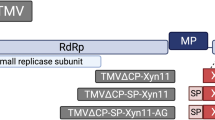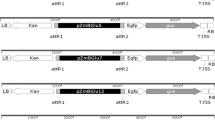Abstract
In order to take advantage of the high thermostability of its product, β-1,3;1,4-glucanase (lichenase), we used a modified version of the licB gene from Clostridium thermocellum as a reporter gene for the analysis of gene expression in transformed plants. The coding region of the licB gene was truncated at both ends. The truncated enzyme retained its activity and thermostability. The modified gene (m-licB), with and without a plant leader peptide-encoding sequence, was expressed in tobacco plants under control of either the Agrobacterium octopine TR-DNA 2′ gene promoter or the promoter of the gene for the small subunit of ribulose-1,5-bisphosphate carboxylase. Expression of licB can be measured quantitatively and accurately, the assay is sensitive and simple enough to be used for analysis of various gene fusion systems or for screening of transformants. The enzyme is very stable and remains active in tissue extracts even after storage for 1 year and survives many thawing-freezing cycles. The lichenase-encoding gene was expressed at high levels in transformed tobacco plants without any apparent detrimental effects on vegetative growth or flowering.
Similar content being viewed by others
Author information
Authors and Affiliations
Additional information
Received: 4 March 1997 / Accepted: 8 October 1997
Rights and permissions
About this article
Cite this article
Piruzian, E., Monzavi-Karbassi, B., Darbinian, N. et al. The use of a thermostable β-glucanase gene from Clostridium thermocellum as a reporter gene in plants. Mol Gen Genet 257, 561–567 (1998). https://doi.org/10.1007/s004380050682
Issue Date:
DOI: https://doi.org/10.1007/s004380050682




